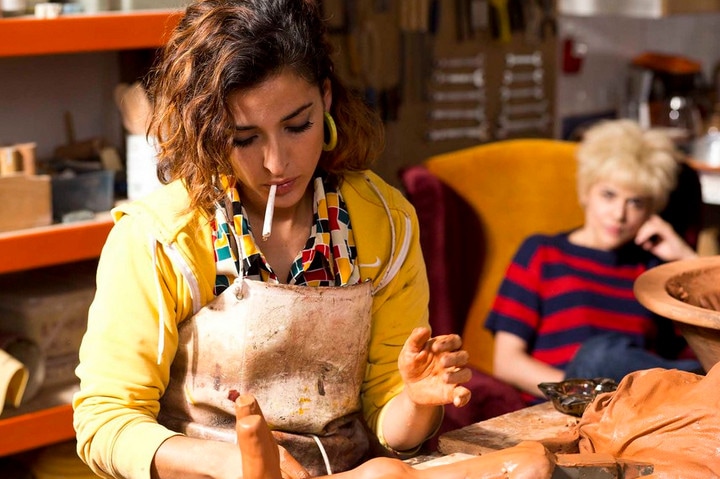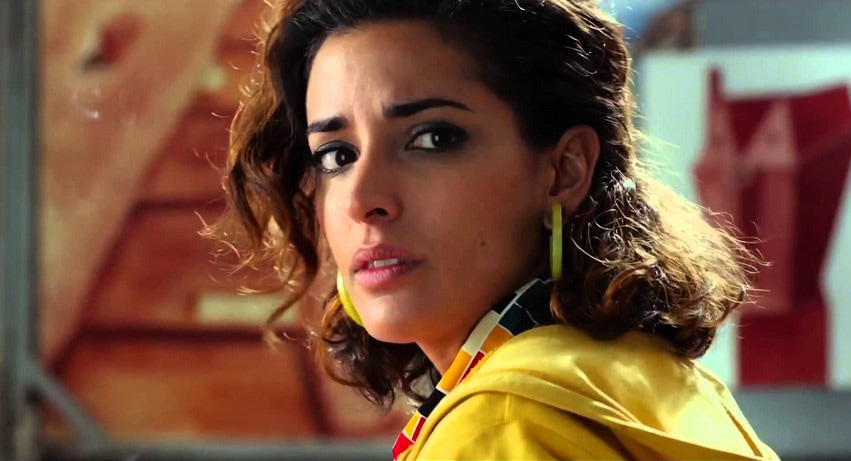
Reviewed by Mick LaSalle / San Francisco Chronicle
“Julieta” stands with the best films of its director, Pedro Almodóvar, but it’s a different kind of Almodóvar film. It’s a film of moment-by-moment virtuosity, and yet it’s without any of the director’s signature flashiness. Here he does a lot with a little, while he usually does a lot with a lot.
One of the most impressive things about “Julieta” is its double casting. It features one actress in the role of a woman from the age of 40 through 56, and another actress as the same woman from ages 25 through 40. This kind of casting is common, but what’s remarkable here — what feels as much a spiritual achievement as a technical achievement — is that we really feel as though we’re seeing the same person. Not merely the same character, but the same face and soul.
The effect of this is profound. Through this cinematic illusion, it’s as if we’re witnessing what time can do to a person, and also what time doesn’t do. The disappointments and heartaches of youth and middle age are present in the face of the older actress, Emma Suarez.
But as depicted by this most sensuous of directors, the beauty is there, too, tempered and battered a bit by the years, and yet elevated by a kind of grace. It’s a rare film that can burrow deep into your spirit and make you feel, “OK, yes, this is life.” “Julieta” touches the essential.
It’s based on three related stories written by Alice Munro. When we meet the older Julieta (Suarez), she is thinking of starting a new life with a new man in another country. But on a street in Madrid, she runs into a childhood friend of her daughter.
The friend remarks on the coincidence — she says that she recently ran into Julieta’s daughter — and the look on Suarez’s face suggests a mix of panic, hope and anguish that really can’t be described. What Julieta doesn’t mention to the friend is that she has no idea where her daughter lives and hasn’t seen or heard from her in years.
When she arrives back at her apartment, Julieta starts writing an account of her youth, in the hope that the daughter might someday read it. And it’s here where the story moves some 30 years into the past, to the fateful train ride when Julieta met the man who would become her husband.
Because Almodóvar is a director who cares about these things, young Julieta (Adriana Ugarte) looks not only like Suarez but exactly like the mid-1980s, with a hairstyle not unlike that of Melanie Griffith around the time of “Body Double.” And the train interiors are saturated with color. They’re beautiful. They look like the past, and they look like romance.
There’s not a scene in this film in which there is not both something to see and an acting moment to savor, as well as some nuance or implication or suggestion to ponder.
But just to talk about Almodóvar’s virtuosity for a moment, there’s a character in the film — that of a housekeeper, who works for Julieta’s future husband — who is a little bit odd and forbidding. The housekeeper has shades of Hitchcock about her, further emphasized by Alberto Iglesias’ Bernard Herrmann-like score.
What’s interesting: In the 1990s, Almodóvar would have hit you over the head with the reference. Here he presents it with the lightest touch, so that you catch it, even as you’re registering everything else. Almodóvar used to be able to do one thing at a time. Now he can do several things at once. He gives us the etymology of the character, but also the subtle variations, even as he’s conveying the power dynamic in the room, and staying focused on Julieta.
The directorial gift is one of the oddest, in a sense, because it’s the hardest to explain or define. Suffice it to say that Almodóvar presents this material in a way that never splits our attention, even as he’s giving us a deluge of sensory and emotional detail. It’s as if he’s internalized the story so completely that he can’t make a gesture — can’t move the camera, can’t shape a moment — without saying something true.
A DISCUSSION FOLLOWS EVERY FILM!
$6.00 Members / $10.00 Non-Members
“Julieta” stands with the best films of its director, Pedro Almodóvar, but it’s a different kind of Almodóvar film. It’s a film of moment-by-moment virtuosity, and yet it’s without any of the director’s signature flashiness. Here he does a lot with a little, while he usually does a lot with a lot.
One of the most impressive things about “Julieta” is its double casting. It features one actress in the role of a woman from the age of 40 through 56, and another actress as the same woman from ages 25 through 40. This kind of casting is common, but what’s remarkable here — what feels as much a spiritual achievement as a technical achievement — is that we really feel as though we’re seeing the same person. Not merely the same character, but the same face and soul.
The effect of this is profound. Through this cinematic illusion, it’s as if we’re witnessing what time can do to a person, and also what time doesn’t do. The disappointments and heartaches of youth and middle age are present in the face of the older actress, Emma Suarez.
But as depicted by this most sensuous of directors, the beauty is there, too, tempered and battered a bit by the years, and yet elevated by a kind of grace. It’s a rare film that can burrow deep into your spirit and make you feel, “OK, yes, this is life.” “Julieta” touches the essential.
It’s based on three related stories written by Alice Munro. When we meet the older Julieta (Suarez), she is thinking of starting a new life with a new man in another country. But on a street in Madrid, she runs into a childhood friend of her daughter.
The friend remarks on the coincidence — she says that she recently ran into Julieta’s daughter — and the look on Suarez’s face suggests a mix of panic, hope and anguish that really can’t be described. What Julieta doesn’t mention to the friend is that she has no idea where her daughter lives and hasn’t seen or heard from her in years.
When she arrives back at her apartment, Julieta starts writing an account of her youth, in the hope that the daughter might someday read it. And it’s here where the story moves some 30 years into the past, to the fateful train ride when Julieta met the man who would become her husband.
Because Almodóvar is a director who cares about these things, young Julieta (Adriana Ugarte) looks not only like Suarez but exactly like the mid-1980s, with a hairstyle not unlike that of Melanie Griffith around the time of “Body Double.” And the train interiors are saturated with color. They’re beautiful. They look like the past, and they look like romance.
There’s not a scene in this film in which there is not both something to see and an acting moment to savor, as well as some nuance or implication or suggestion to ponder.
But just to talk about Almodóvar’s virtuosity for a moment, there’s a character in the film — that of a housekeeper, who works for Julieta’s future husband — who is a little bit odd and forbidding. The housekeeper has shades of Hitchcock about her, further emphasized by Alberto Iglesias’ Bernard Herrmann-like score.
What’s interesting: In the 1990s, Almodóvar would have hit you over the head with the reference. Here he presents it with the lightest touch, so that you catch it, even as you’re registering everything else. Almodóvar used to be able to do one thing at a time. Now he can do several things at once. He gives us the etymology of the character, but also the subtle variations, even as he’s conveying the power dynamic in the room, and staying focused on Julieta.
The directorial gift is one of the oddest, in a sense, because it’s the hardest to explain or define. Suffice it to say that Almodóvar presents this material in a way that never splits our attention, even as he’s giving us a deluge of sensory and emotional detail. It’s as if he’s internalized the story so completely that he can’t make a gesture — can’t move the camera, can’t shape a moment — without saying something true.
A DISCUSSION FOLLOWS EVERY FILM!
$6.00 Members / $10.00 Non-Members








